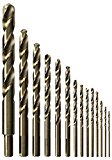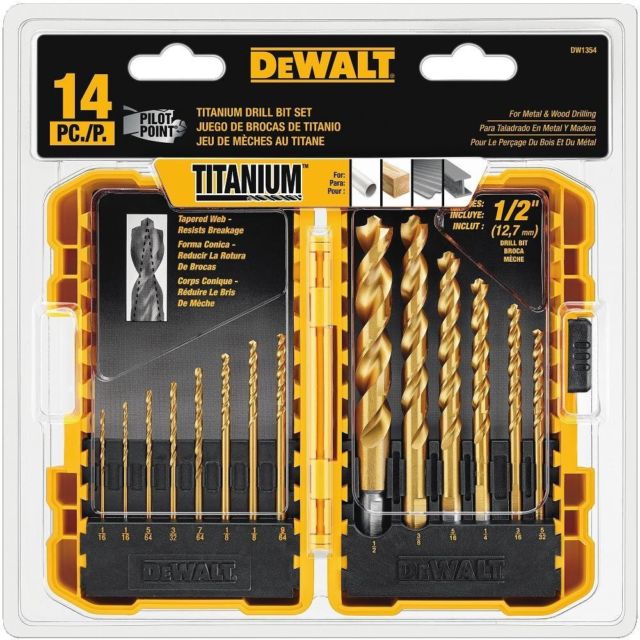Both cobalt and titanium drill bits are able to work fine for a long time. But each type has its own peculiar properties. For example, sharpening titanium bits will grind off their coating, cobalt bits are great for tough steel but are brittle, etc. Read our short cobalt vs titanium drill bits comparison to choose the right bits for your project.
The titanium bits work great for metal cutting machines. Especially in automated systems, which drill lots of closely controlled holes. Used in a hand drill, it is easy to break through the coating (or definitely when sharpening) and then you have an HSS bit (not so bad too).
A high-quality HSS bit is fine, as long as you keep them sharp it’s a reasonable investment. Learn how to sharpen them with a bench grinder, or better a drill doctor (but get one of the higher end ones that will do split points). Heat kills bits. Using cutting fluid keeps the bit cool and prolongs a lot the life of the bit.
Cobalt vs Titanium Drill Bits Comparison
(Cobalt vs HSS Comparison)
| Titanium bits |
Cobalt bits |
| Titanium vs Cobalt Drill Bits – General Information | |
|
“Titanium” bits are made of carbon steel, SS (Speed Steel) or HSS (High Speed Steel) with TiN (Titanium Nitride, gold color), TiCN (titanium carbo-Nitride, TiALN (titanium aluminum nitride, violet color), AlTiN (titanium aluminum nitride) |
‘Cobalt’ bits are HSS bits with cobalt in alloy. Widely used grades alloyed with cobalt M42 is 8% and M35 is 5% cobalt. They have better heat resistance, are harder, allow higher cutting speeds. Unsurprisingly they’re also a bit more brittle so are easier to break |
| Cobalt vs Titanium Bits – Application | |
| Comparison of cobalt vs titanium drill bits shows, that in soft abrasive material such as plastic and wood, the coating improves the life of the tool and reduces the cutting temperature. Most non-industrial users, with industrial tooling and machinery to work steel are going to blunt the cutting edge through gross edge damage from imperfect alignment and uncontrolled feeding, not through gradual wear, which is where TiN is of benefit. | Cobalt HSS offers no advantage in drilling wood, mild steel, and softer non-ferrous metals.Comparison of titanium vs cobalt drill bits shows, that cobalt drills are intended for stainless and hardened alloy steels where heat and abrasion are factors in the cutting environment. They feature “red hardness” and hold their edges when drilling the toughest materials. |
| Titanium vs Cobalt Bits – Types | |
| TiN – Titanium Nitride resists friction and improves the heat transfer, providing longer life in comparison with standard high-speed steel bits.
TiCN – Titanium Carbo-Nitride is harder and more durable than other coatings. Used for cast iron, stainless steel, and aluminum. AlTiN – Titanium Aluminum Nitride designed to increase the temperature resistance and hardness. The bits are heat resistant up to 1500F (800 degrees Celsius). Not for drilling aluminum. |
(M35) 5% cobalt tool bits are designed for heavy-duty machining alloy heavy-duty tough materials, such as castings and forgings. They have high heat and abrasion resistant properties.
(M42) 8% bits are designed for machining work hardening alloys and other tough materials. They have increased water resistance and tool life. |
| Cobalt vs Titanium Drill Bits – My Experience | |
| A micro-thin coating on a top of bad Chinese steel is no substitute for proper steel to begin with. Made in America HSS titanium drill bits will work for you fine if you sharpen them properly. They’d work much better with proper back-cut and relief.
New TiN drill bits cutting edge wore much slowly. TiN has great hardness and coating repels heat at the cutting tip. |
I find cobalt bits to be much better performing for drilling through mild steel. They feel sharp after drilling about 30 holes. I don’t have to use so much cutting fluid to keep the bit cool and they cut quicker and cleaner.
Typically, high-quality Cobalt bits are made from either T15 cobalt or M42 steel. You can do a spark test on the bench grinder. M42 will have wider sparks which fork at the ends. |
|
I always use a lot of cutting fluid to keep the bits cool. Dull bits heat up much quicker and drilling longer, so I use my sharpener often. I have a sharpener and use it regularly to keep my HSS bits sharp. So the coating TiN remains only on the flute, but not on the cutting edge. Cobalts hold their edge much longer, and after proper sharpening, they work like brand new bits. |
|
Cobalt vs Titanium Drill Bits Alloys
| Grade | C | Cr | Mn | Mo | Co | V | W | Si |
| T1 | 0.65-0.80 | 4.00 | 0.1-0.4 | – | – | 1 | 18 | 0.2-0.4 |
| M1 | 0.80 | 4 | – | 8 | – | 1.0 | 1.5 | – |
| M2 | 0.95 | 4 | – | 5 | – | 2.0 | 6.0 | – |
| M7 | 1.00 | 4 | – | 8.75 | – | 2.0 | 1.75 | – |
| M35 | 0.92 | 4.3 | – | 5 | 5 | 1.8 | 6.4 | 0.35 |
| M42 | 1.10 | 3.75 | – | 9.5 | 8.0 | 1.15 | 1.5 | – |
| M50 | 0.85 | 4 | – | 4.25 | – | 1.0 | 0.10 | – |
Cobalt vs Titanium Drill Bit – Conclusions
Choosing cobalt drill bits vs titanium, you must take into account materials in which you’ll drill. Titanium suitable for wood, plastic, and most metals.
Cobalt bits are the choice in the case hardened steel, it’s amazing how they just cut through. Cobalt steel makes them hard enough to bore through stainless steel too. Cobalt makes these bits also dissipate heat rapidly – prime consideration when cutting metal.
Cobalt bits you can sharpen many times, they are made of cobalt steel throughout the bit. But cobalt steel is a more brittle then HSS, it can cause breakage.
Carbide bits are the best choice for concrete and such.








